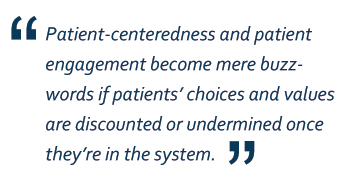Patient Engagement: Expert Molly Mettler Talks about Challenges
| September 26, 2011
This interview is the third in a series of brief chats between CFAH president and founder, Jessie Gruman and experts our CFAH William Ziff Fellows who have devoted their careers to understanding and encouraging people's engagement in their health and health care.
Molly Mettler believes that the grail in medical shared decision-making is making it possible to combine evidence-based options with the patient's personal preferences and values.
Gruman: What is the most significant challenge people now face in engaging in their health and care?
Mettler: Navigating the system. Or rather, navigating our non-system. We don't make it easy for people to a) get health care, b) go through it without harm, and c) benefit from it. There's lots of talk about patient-centered medical homes and Accountable Care Organizations, but what do those look like and how are they going to affect me, the health care consumer? I can only hope they lead to a more rational system, and one that's easier to engage with. Patient-centeredness and patient engagement become mere buzzwords if patients' choices and values are discounted or undermined once they're in the system.' '
Gruman: In past conversations, you have noted other buzzwords that get in the way'
Mettler: Evidence-based has become a buzzword. On the whole, I do think it's useful to establish an evidence base for clinical guidelines, rather than leaving it to politics, or lobbying, or those who can craft a 15-second sound bite. However, I think 'evidence-based' is being overused as a modifier/adjective and that the insistence on having that particular adjective in place tends to displace the importance of patient autonomy.
Gruman: How does it do that?
Mettler: Once the patient is well-informed and understands her options, patient autonomy in treatment needs to be honored within legal and ethical limits. The grail in medical shared decision-making is making it possible to combine evidence-based options with the patient's personal preferences and values. If a patient chooses a treatment path not supported by good evidence, then payment for that treatment becomes a judgment call with patient, doctor, payer, and the good of the whole all part of the judging.
Gruman: What is a significant point of leverage for increasing people's engagement in their care?
Mettler: If a significant point of leverage means the point where an individual has to do something about his/her health and healthcare, then I think there are three significant personal events: having a baby; at the time of a critical diagnosis of serious illness; and end of life planning, if they aren't actively denying this is needed. These are points in the life journey where health comes to the forefront and people are ready, even eager, to be engaged.
More patient engagement inteviews with our Ziff fellows by Jessie Gruman











